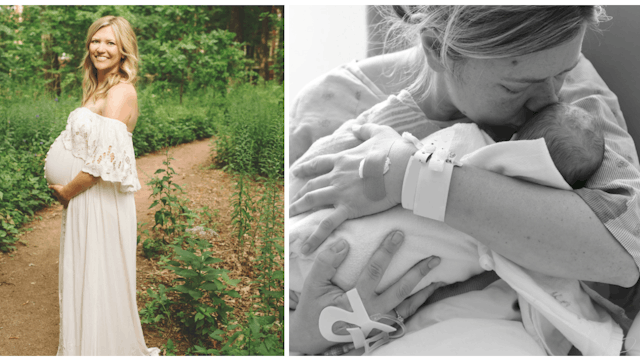Breastmilk Donation Can Be Incredibly Healing For Mothers Who Have Lost Their Babies

Losing a baby is one of the most devastating realities that a mother could face. Yet it’s more common than you might think: 4 out of every 1,000 mothers will lose their baby during or shortly after childbirth.
In October of 2017, Kate Weidner of Oak Park, Illinois lost her second son Everett the day after he was born due to complications from a rare but serious pregnancy condition called vasa praevia.
Weidner was heartbroken and grieved deeply. Looking for a way to stay connected to Everett and to move through her grief, she turned to milk donation. She tells Scary Mommy that she had breastfed her first son, Gus, and knew her body would start to produce milk for Everett.
No one in the hospital suggested the idea of breastmilk donation to Weidner, but she had spent some time in the NICU before Everett’s birth (she’d been preparing for Everett to be a preemie before he passed away) so she knew how important and life-saving breastmilk is for preemies. And she wanted to honor Everett’s legacy in a meaningful way.
Still, she didn’t realize quite how healing the experience of donating her milk would be.
“Pumping provided me a much-needed routine, and way of putting one foot in front of the other,” says Weidner. “I was supposed to have days filled with baby snuggles and sleepless nights and instead, I had an empty nursery and a wide open calendar. That was all so intimidating, but pumping helped me take one step at a time by slowly breaking my day into small increments.”
Susan Urbanski, Donor Coordinator for the Mothers’ Milk Bank of the Western Great Lakes, where Weidner donated, tells Scary Mommy that about 15% of their donors are bereavement donors. In addition to giving the mothers a sense of purpose and connection to their babies, milk donation can help mothers decrease the likelihood of depression, in part due to the “feel-good hormones” (oxytocin and prolactin) released during pumping.
“Some have told us that it felt ‘motherly’ even though they didn’t have a child in their arms,” says Urbanski. “I recall one donor in particular who acknowledged that she was depressed, but said that the hormones released while pumping gave her just that little ‘bounce’ that prevented her from hitting the bottom.”
Many of the mothers who donate to the Mothers’ Milk Bank of the Western Great Lakes get to know one another, and having that sense of community with other grieving, pumping mothers can be incredibly healing.
This video, produced by the Mothers Milk Bank of the Western Great Lakes, showcases the stories of some amazing moms — including Weidner — who donated milk after loss. (Major tissue warning ahead!)
“In the year since Everett passed, I have become very involved with the milk bank, and have been lucky to connect with a beautiful community of families,” Weidner shares. “Some of these families include other loss moms, some are donors with extra supply, and some are recipients. Joining the community of the Mothers Milk Bank of the Western Great Lakes has been one of the most rewarding parts of this entire process.”
Although the mothers don’t connect directly with the babies or families they donate to, they know that their milk is saving lives.
“About 80% of the pasteurized milk we dispense goes to hospital NICUs and is offered to premature babies when mom’s own milk is not available,” Urbanski says. “These babies are often incredibly fragile. A human milk diet can prevent serious complications and surgeries from a devastating intestinal illness called necrotizing enterocolitis (NEC).”
Other donated milk is given to full-term and older babies, babies with medical challenges, and NICU graduates that require on-going tube feeding.
Weidner ended up pumping for six weeks and donated hundreds of ounces of milk to babies in need. She wants all mothers to know that if they choose donate, they can do it on their own terms – there is no rule about the amount that you have to pump (every ounce makes a difference!), and you can come up with a pumping schedule that fits into your schedule.
Most of all, Weidner wants mothers to know that milk donation is an option – one that can bring you some much-needed solace in a difficult time – and one that she wishes more mothers knew about.
“In the hospital, no one approached me about it, I think because they just didn’t want to say the wrong thing or make life harder in any way,” Weidner shares. “But what people don’t realize is that telling moms about milk donation gives them choices, when all their plans and dreams have been ripped away. I just want all moms to be aware they do have a choice – so that they can have some sense of control over their bodies, their next steps, and their child’s legacy.”
Urbanski says that the Mothers’ Milk Bank of the Western Great Lakes takes milk donations from any bereaved mother “regardless of medications or lifestyle concerns.” Milk is pasteurized at the bank and screened carefully. Any milk that is not appropriate for babies can be donated for research.
“We understand that milk donation is a very personal choice,” says Urbanski. “Not every mother will want to donate her milk, and we respect that decision. One of our goals is to increase awareness of bereavement donation as an option so that each family can make the choice that feels right to them.”
If you or anyone you know wishes to donate milk to babies in need, you can find a milk bank near you at the Human Milk Banking Association of North America (HMBANA). Informal milk sharing is also a good option for some mothers, and you can find more information about that at Eats on Feets or Human Milk 4 For Human Babies.
This article was originally published on